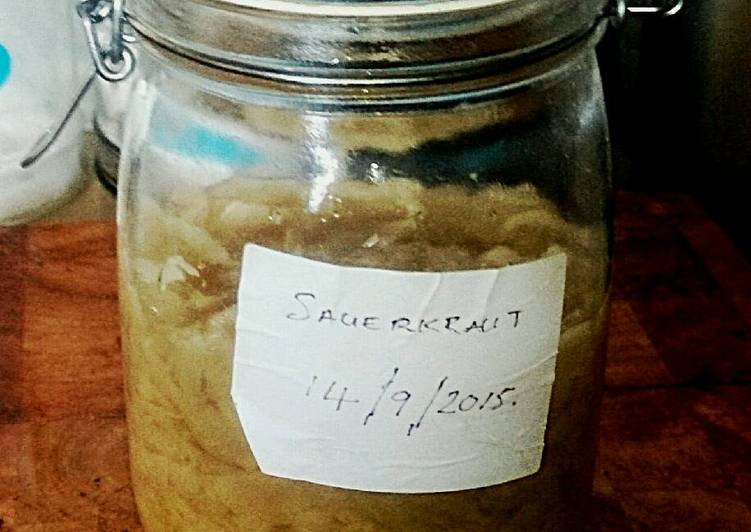Tex's Small Batch Sauerkraut. Sauerkraut is a nutritional powerhouse that incredibly tasty to boot. It's the way people have been preserving cabbage for generations and is high in vitamin C. In a Pickle: Small Batch Sauerkraut.
 We'd get Dodger dogs with yellow mustard, relish, chopped onions and a dab of sauerkraut.
And for years, that's how I knew it.
This is about preparing a couple jars of cabbage for fermenting a small batch of sauerkraut.
You can have Tex's Small Batch Sauerkraut using 5 ingredients and 6 steps. Here is how you achieve it.
We'd get Dodger dogs with yellow mustard, relish, chopped onions and a dab of sauerkraut.
And for years, that's how I knew it.
This is about preparing a couple jars of cabbage for fermenting a small batch of sauerkraut.
You can have Tex's Small Batch Sauerkraut using 5 ingredients and 6 steps. Here is how you achieve it.
Ingredients of Tex's Small Batch Sauerkraut
- You need 1 medium of white or red cabbage.
- You need 1 1/2 tbsp of kosher or sea salt.
- Prepare 2 tsp of caraway seeds (optional).
- You need 1 1/2 liter of (or larger) Kilner or clip lid jar.
- It's 50 of marbles in a sandwich bag.
Here is a link to the fermentation lid kit I use. The key to making small batch sauerkraut is to use a wide mouth jar with a rubber gasket and wire bale. The key for us is the small batch in the wire bale jar. We tried it once using a stoneware sauerkraut jar.
Tex's Small Batch Sauerkraut step by step
- Cut the cabbage into quarters and slice crossways.
- Tear ⅓ of the slices into a bowl and sprinkle with a teaspoon of salt. Squeeze with your hands until the juice begins to come out of the cabbage forming a brine solution with the salt. After a few minutes there should be almost enough brine to cover. At this stage add another ⅓ and another tsp. of salt. Begin squeezing again. Finally, add the last ⅓, and the rest of the salt and massage again until the cabbage is almost submerged in the brine..
- Transfer to your jar, add the caraway seeds if using, and tamp down with the end of a rolling pin. When the cabbage is compressed and submerged place the sandwich bag filled with marbles to keep it from floating. Do not close the lid. Instead, place a clean tea towel over the neck of the jar and tie with string or an elastic band. This keeps bugs out but allows air to flow which is necessary in the fermentation process..
- .
- Finally store in a cool, dark, place for 28 days. It's perfectly good to eat at any time, but I find 28 days is best. Check every 3 to 4 days, scraping away any mold, and tamping down again. The mold actually develops from the same kind of bacteria that exists in yoghurt, and is harmless. Some people don't like eating moldy food though..
- After 28 days put the lid on and refrigerate. If your brine stops covering your 'kraut, dissolve 1 teaspoon of salt in 1 cup of water and top up..
It took three or four cabbages, maybe even five, was a lot of work and we obviously. Small-batch producers will let the cabbage sit in barrels for upwards of a year to let the product slowly ferment before it even needs to be bottled, and as long as it's refrigerated and sitting in brine, the kraut can last indefinitely. Lacto-fermented kraut is touted for its health benefits like vitamins C and K, and. As an experiment, for my first attempt, I'm making a small batch of sauerkraut. Its setup is pretty amateur, no I plan to leave the kraut for longer before calling it "finished", and to be entirely honest, I don't really know what sauerkraut is ideally supposed to taste like.
